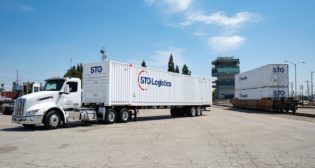
KCS 2Q21: Strong Volume; Service ‘Short of Expectations’ (Updated, Cowen)
Written by Marybeth Luczak, Executive Editor
“KCS delivered strong second-quarter volume growth, as our franchise benefited from unique growth drivers and the economy recovered from the COVID-19 downturn,” KCS President and CEO Patrick J. Ottensmeyer said. “Although we are pleased with the strong volume growth, we fell short of our own expectations for customer service.”
Kansas City Southern (KCS) on July 16 was the first Class I to report second-quarter 2021 earnings. For the possibly merger-bound railroad, revenue of $749.5 million grew 37% from the prior-year period ($547.9 million) based on higher carload volumes (up 31%), higher fuel surcharge, and the strengthening of the Mexican peso against the U.S. dollar. Service quality, however, was somewhat short of company expectations.
Second-quarter operating expenses were $1.18 billion, including a $700 million merger termination fee paid to Canadian Pacific (CP), following the KCS Board’s May 21 decision that CN’s offer to combine was a “Company Superior Proposal.” That fee is expected to be reimbursed by CN upon the August 19 KCS shareholder vote on the CN-KCS merger, according to KCS.
For second-quarter 2021, including the above-mentioned merger cost, KCS posted (under GAAP) an operating loss of $431.7 million, a net loss of $378.0 million, or $4.17 per diluted share, and an operating ratio of 157.6%. Adjusted (non-GAAP), the operating ratio was 61.4%, a 3.8 basis point improvement vs. the prior year, and diluted EPS came in at $2.06, an increase of 79% vs. the prior year.


As for operating metrics (see chart below), KCS reported that in second-quarter 2021, train velocity of 12.2 mph was down 29% from second-quarter 2020; terminal dwell time of 26.1 hours fell 29%; and train length of 6,778 feet was 2% shorter.

The railroad also provided a current outlook of:
• “Double-digit” revenue growth in 2021.
• An operating ratio of approximately 60% in 2021, and 56%-57% in 2022.
• Earnings per share of about $9.00 in 2021, and $10.50-$11.00 in 2022.
• Capital expenditures of approximately 17% of revenue in 2021 and 2022.
• Free cash flow of about $700 million in 2021 and 2022.
On the merger front, KCS reported that the joint CN-KCS filing to the Surface Transportation Board (STB) on July 6 “demonstrates that our proposed voting trust satisfies the STB’s test: 1) It precludes premature control of KCS during the trust period; and 2) Approval of the proposed voting trust is in the public interest and causes no harms … CN and KCS respectfully look forward to a positive response from the STB on our voting trust and are fully committed to working toward a successful closing of our transaction.” Common control approval from STB and other applicable regulatory authorities is expected by second-half 2022.

“KCS delivered strong second-quarter volume growth, as our franchise benefited from unique growth drivers and the economy recovered from the COVID-19 downturn,” KCS President and CEO Patrick J. Ottensmeyer said. “Although we are pleased with the strong volume growth, we fell short of our own expectations for customer service.
“Our operating team is focused on implementing structural and sustainable changes that will improve operational performance and the resiliency of our network. To that end, we have deployed additional assets and crews in support of our service recovery, setting the company up to continue delivering robust volume growth while improving customer service in the second half of 2021.

“During the second quarter, KCS also announced a pro-competitive merger with CN, which will deliver more choices to customers through the creation of new, single-line service options between the U.S., Canada and Mexico. This combination represents an exciting opportunity for KCS and CN stakeholders, and we look forward to delivering a safer, faster, leaner and stronger railroad.”

The KCS Investor Relations site provides more details on second-quarter 2021.
Cowen Insight: ‘Back Half Weighted Guide After 2Q Miss’

“KSU [Kansas City Southern] reported a 2Q that fell short of our expectations, causing a downward revision of profitability guidance, as costs relating to congestion and regulatory headwinds will outweigh revenue growth,” reported Cowen and Company analysts Jason H. Seidl (Managing Director and Railway Age Wall Street Contributing Editor), Matt Elkott and Elliot Alper. “We are cautious on the optimism management expects for 2H21, which implies a strong rebound across the network; we believe this could take longer to play out. Reiterate Outperform.”
Cowen’s Key Takeaways:
• “KSU reported 2Q revenue growth of 37% to $749.5MM, approximately in line with our estimate, with carloads up 31%. KSU reported its $700MM termination fee paid to CP, which was recorded for GAAP purposes, but will be reimbursed by CNI [CN] upon shareholder vote on the merger. Adjusted OR of 61.4% fell short of our 58.3% OR estimate, which caused KSU to fall $0.12 short of our bottom-line estimate (and consensus figure) of $2.18.
• “Regulatory headwinds in Mexico relating to the importation of refined products have resulted in headwinds for KSU, as well as incremental compensation expenses related to profit sharing due to labor reform in Mexico, which has been called out in the past. Management cited other macro challenges that will affect growth; we will see if the other Class I’s call out these similar headwinds for the rest of 2021 as we believe the majority of the shortfall in the quarter and revised outlook is KSU-specific. While we would have expected the stock to be under more pressure following the earnings call, we believe the pending merger is providing KSU with a backboard.
• “Management revised 2021 and 2022 guidance, maintaining revenue growth in the double digits, but brought OR guidance to approximately 60%, compared with previous guidance of approximately 57.5%. 2022 OR guidance was worsened by 1% to 56%-57%. While previous 2021 EPS guidance called for $9.00 or better, new guidance revised slightly downward to approximately $9.00. We will continue to monitor carload trends, particularly in its Mexico business.
• “We came away from the earnings call slightly less optimistic about the mid-August timeline we have previously written about for a decision on CNI’s Voting Trust. Management stated that the STB will take whatever time they need to review the deal, and KSU’s expectation is that a decision on the voting trust will come in the second half of this year, a wider timeline than we initially thought. This could be due to fears of [Chairman] Oberman intentionally putting the brakes on the merger as the STB awaits a new appointment of a new Board member that may flip the political leanings of the Board itself.
• “We adjust our 2021 estimate to $8.85 from $9.10. We note we are $0.15 below KSU’s approximately $9.00 guide, which is derived from our cautious volume outlook for the remainder of2021, as well as the company’s mention that pricing in 2Q was below rail cost inflation. We are maintaining our 2022 EPS estimate of $10.50 (which is at the low end of KSU’s 2022 EPS guidance of $10.50-$11.00) and our Outperform rating. Our $300 KSU price target continues to be on hold as we await news from the STB regarding the CNI trust.”



